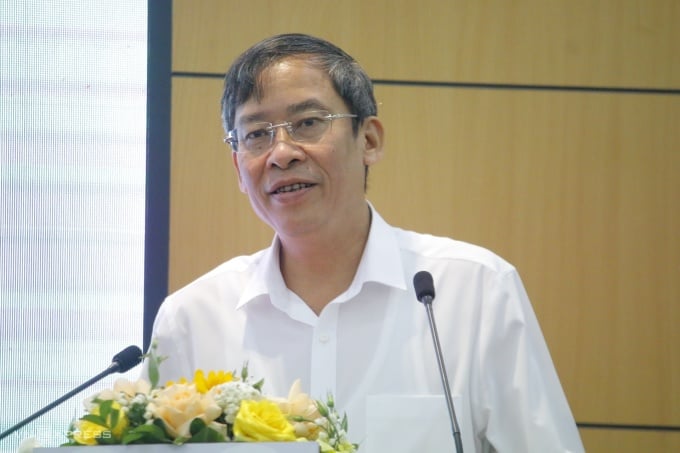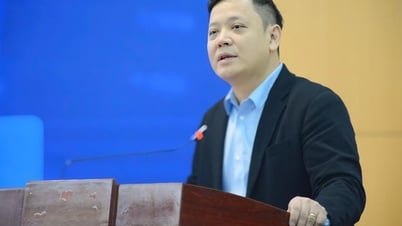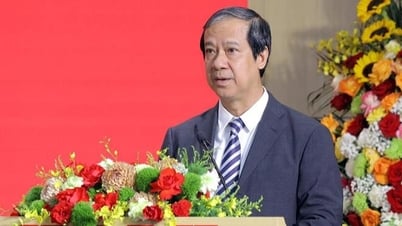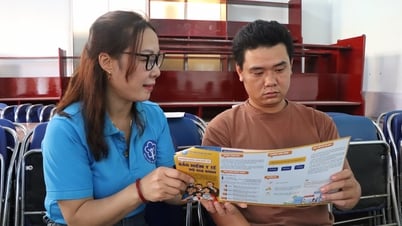A representative of the Ministry of Education and Training said that the implementation of "happy schools" must come from the needs of schools and teachers, and should not be turned into a movement and put pressure on them.
At the Happy School Discussion on the morning of October 25 organized by the Vietnam Institute of Educational Sciences and the Happy School Support and Development Fund (Happy Lof Schools), Mr. Vu Minh Duc, Director of the Department of Teachers and Managers, Ministry of Education and Training, acknowledged that happiness is an abstract concept, and each person and each stage has a different understanding. In short, happiness is a feeling of excitement and positive emotions of people in each specific situation. For example, for his generation, going to school is happiness.
Regarding the reason for building happy schools, Ms. Louise Aukland, a neuroscience researcher at Oxford University, UK, said that the education sector needs to be responsible for building a better learning environment for students.
Citing data from the United Nations Educational, Scientific and Cultural Organization (UNESCO) and the United Nations Children's Fund (UNICEF), Ms. Louise said that one in three students are subjected to violence every month at school and 20% of adolescents worldwide are suffering from mental disorders.
"We must not only make students laugh, but also help them enjoy going to school, have positive emotions, thoughts and mindsets. Happy young people will achieve better results," she said.
In 2018, the Ministry of Education and Training began implementing the happy school model. After that, some provinces, cities, and schools turned this activity into a competitive movement with many criteria, with preliminary and final summaries, and rewards. However, Mr. Vu Minh Duc said that this needs to come from the intrinsic needs of schools and teachers.
"Don't turn happy schools into a movement or a competition criterion and then force schools to implement it. That will create more pressure for them," Mr. Duc said.
In addition, according to Mr. Duc, many schools have implemented it effectively, helping to reduce pressure on students and teachers, and teachers and students enjoy going to class. However, some models are not suitable and are being exploited for economic purposes. Therefore, he suggested that schools must ensure the core values of this model.

Mr. Vu Minh Duc, Director of the Department of Teachers and Managers, Ministry of Education and Training, on the morning of October 25. Photo: Thanh Hang
Dr. Le Thi Quynh Nga, Vietnam Institute of Educational Sciences, suggests a happy school model with two main factors.
Ms. Nga said that the first factor is the external factors such as friendly and safe landscape, solid facilities, suitable for the age and development of children. In addition, this criterion also includes the relationship between people, so that students feel respected, trusted, and shared.
"For example, if the school gate is about to collapse or the ceiling fan is at risk of falling, how can students be happy? Similarly, the way teachers treat each other and staff treat students also needs to be focused on, ensuring civility and respect," she said.
The remaining factor, Ms. Nga believes, is that because happiness is a personal emotional state, in order for students to feel happy, they need to be physically and mentally healthy.
"Schools should actively organize sports activities to help students improve their health. As for their spirit, how can we support them to think positively, which will lead to positive emotions, the source of happiness," said Ms. Nga.
Sharing her practical experience, Ms. Le Thi Mai Huong, Vice Principal in charge of the Experimental Science Education Primary, Secondary and High School, said that there is no general school-wide regulation. Instead, students in each class develop their own regulations. Then, they will be more responsible for implementing them.
"If a student violates the rules, we focus on psychological counseling to find out why the child reacts that way. We cannot criticize them just because they are wrong," Ms. Huong shared.
Nearly a week ago, the workshop on happy schools organized by the Ministry of Education and Training in Hanoi attracted more than 500 teachers from more than 60 provinces and cities. Here, teachers discussed and sought solutions to reduce pressure in schools, find ways to educate positively, resolve school violence,...
Thanh Hang
Source link


![[Photo] Prime Minister Pham Minh Chinh receives Swedish Minister of International Development Cooperation and Foreign Trade](https://vphoto.vietnam.vn/thumb/1200x675/vietnam/resource/IMAGE/2025/5/12/ae50d0bb57584fd1bbe1cd77d9ad6d97)

![[Photo] Prime Minister Pham Minh Chinh works with the Standing Committee of Thai Binh Provincial Party Committee](https://vphoto.vietnam.vn/thumb/1200x675/vietnam/resource/IMAGE/2025/5/12/f514ab990c544e05a446f77bba59c7d1)

![[Photo] Prime Minister Pham Minh Chinh starts construction of vital highway through Thai Binh and Nam Dinh](https://vphoto.vietnam.vn/thumb/1200x675/vietnam/resource/IMAGE/2025/5/12/52d98584ccea4c8dbf7c7f7484433af5)




























































































Comment (0)